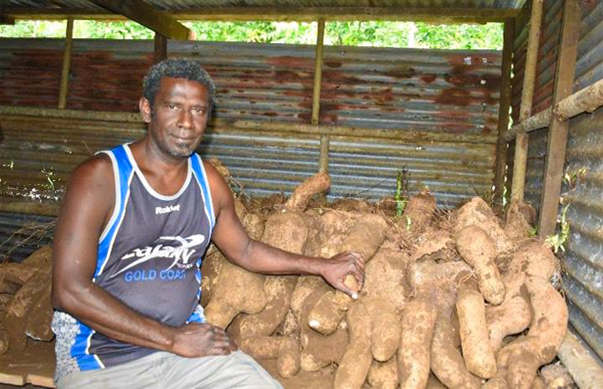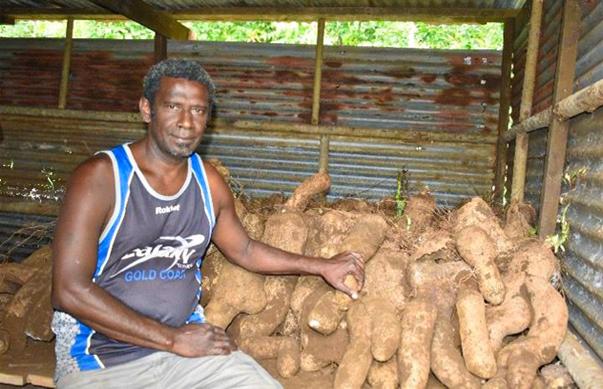The Pacific region is highly vulnerable to climate change and is facing high incidences of non-communicable diseases. Crop diversity has a crucial role to play in (1) developing improved crops that are adapted to climate change and tolerant to pests and diseases; and (2) producing healthy food for the growing population. In regards to the use of food crops, the Pacific faces a number of challenges that include among others: limited capacity of countries to develop and operationalise sustainable seeds systems and poorly developed seeds networks in the region. The Center for Pacific Crops and Trees (CePaCT) holds in trust a variety of food security crops that offer a unique opportunity to combat NCDs and improve the region’s adaptation to Climate Change.

Background
Seed is the basis of life and serves as the foundation for food and nutrition security. Although the Pacific could count on a huge diversity of food crops, loss in biodiversity is increasing narrowing the genetic diversity that was common the region.
Developing seed is vital for the promotion of diverse, resilient and nutritional food systems. Crop improvements through access to new and improved crop diversity and breeding are integral parts of a seed system that is crucial for a resilient, healthier crop diversity.
Yam, are perennial herbaceous vines, that are cultivated for the consumption of their starchy tubers in many parts of the Pacific. It is an important food and nutrition security crop in the Pacific and a cultural crop in Vanuatu and other Pacific islands like the Federated State of Micronesia (FSM), Tonga, Samoa and Fiji.
Our Role
The Pacific Seeds for Life (PS4L) initiative aims to strengthen seed systems by creating the enabling environment for building the capacity on seeds systems to improve availability, access and use of Climate resilient and nutritious crop.
CePaCT is the Pacific’s only regional gene bank that is dedicated to conserving our region’s important crops and facilitate the access of our Pacific people to these materials when they need it. Over the period 2004 – 2018, CePaCT distributed over 80,000 plant samples of 15 crops, including Yams and other root crops to over 50 countries worldwide.
What we aspired to do and how we did it?
The PS4L initiative provided PICTs the tools and capacities to develop seed policies, operationalize their seed systems initiatives and in articulating a pan-Pacific governance structure. Through the Pacific Plant Genetic Resources Network (PAPGREN), the PS4L established requisite functions and linkages with seed producers and strengthened key linkages with CePaCT that provides breeder seed.
CePaCT acquired African yam varieties from the International Institute of Tropical Agriculture (IITA). These varieties were selected primarily for their tolerance to the anthracnose disease that affects yam in most tropical regions as well as for their high yielding traits.
Ms Marie Melteras of the Vanuatu Agriculture Research and Training Centre (VARTC) acquired five accessions specifically to increase their local diversity, their tolerance to harmful diseases (mainly yam anthracnose or dieback) and their high yielding properties.
VARTC sourced these varieties for purposes of assessing their specific traits and for using them as breeding stock with local varieties in order to develop hybrid varieties suitable under Vanuatu agro-ecological conditions.
Early/incremental change demonstrate through statistics – evidence
One of the newly bred hybrid yams was called ‘white waelu’ named after the champion farmer White Sailas of Santo, Vanuatu and proved adaptable to climate change, disease tolerant as well as high yielding[1].
In July 2019, Mr Sailas harvested 20 tonnes of yams of which 50% comprised this new ‘white waelu’ hybrid yam. These yams were sold at VT150/kg with annual earnings of VT3 Million.
Two other new varieties were bred and named in honor of Dr. Roger a key collaborator of CePaCT and Jerome, champion yam farmer and Vanuatu landowner, Chief Jerome Natu, also from Santo[2].
These 3 newly bred yam hybrids were launched officially at the 2017 Saratamata, Penama Province Yam Festival by the Minister of Agriculture, Livestock, Forests, Fisheries and Biosecurity (MALFFB), Hon. Matai Seremaia. The new hybrids generated a lot of interest from farmers resulting in increased coordinated efforts, facilitated under the Pacific Seeds for Life in the mass production of planting materials for all farmers across Vanuatu.
As the service provider, CePaCT has been exploring avenues to access these new hybrids of yams from Vanuatu for inclusion into its own collections and to avail them to other PICTs.
As Ms Melteras mentioned in an interview with SPC CePaCT, “We (Vanuatu) have a lot of D. alata (yam species) but we only have two cultivars of D. rotundata yams. I thought it would be good for us to have these new D. rotundata species to increase our diversity”
According to Ms Melteras, ‘these African yams develop flowers very early’ and they ‘develop a lot of flowers as compared to their local varieties’. This key feature made it possible for their breeding efforts to be successful in the end.
Lessons Learned
Developing a fully functional seed system in the Pacific as elsewhere requires coordinated efforts among all actors along the seed systems chain, ongoing capacity building and development of seed policies to enhance local seed production and access to quality and safe seed.
The sharing and having access to new crop diversity is critical to the development of new fit-for-purpose (e.g. resilient (to climate change, pests and diseases), nutritious and high performing crop varieties. This Vanuatu yam success story highlights the critical role of genebanks like IITA and CePaCT in conserving and facilitating access of people to the diversity being conserved for future use.
Partnerships is crucial to realising clear long-term impacts. This story highlights the importance of fostering relationships on all levels to realise a common goal. The SPC CePaCT by virtue of its regional role has invested a lot in building and nurturing key partnerships on all levels and particularly creating a closer link between global development efforts to the national level to our PC member countries.
Empowering our local people is a critical component for seed systems development. The success of the seed system model demonstrated by Vanuatu in this particular case study is deeply rooted in the ‘empowerment’ of its people along the system. The expert yam breeder, the late Dr Roger Malapa trained not only VARTC staffs but also DARD staffs on yam breeding techniques. After his passing in 2015, these techniques are still being exercised by his successors.
[1] https://dailypost.vu/news/over-tonnes-of-yam-harvested-by-santo-lead-farmer/article_f4505527-3894-52c4-8b7e-2410ed2047a8.html
[2] https://dailypost.vu/news/hybrid-yam-named-after-late-dr-roger/article_02023a30-dbc5-5a8b-90c9-e40620a91112.html
